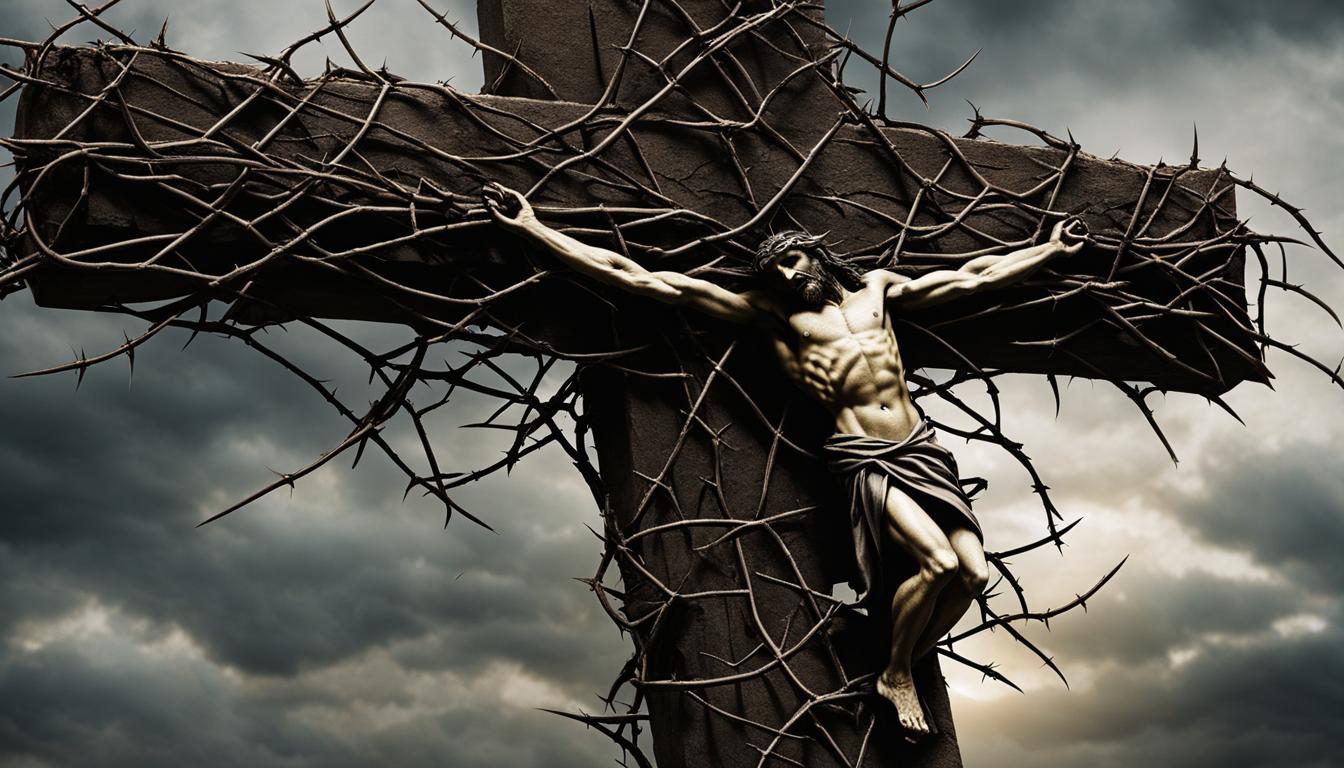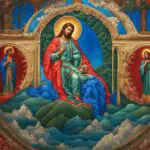Thorns hold significant symbolism in the Bible, representing the curse that resulted from Adam’s disobedience. Genesis 3:17-19 describes how thorns and thistles became a part of the fallen world, bringing forth pain and frustration. Thorns are a precursor to the gospel, as seen through Jesus’ journey to the cross, where He wears a crown of thorns as a symbol of the curse. The removal of thorns represents the redemption and transformation offered through Jesus to believers.
Key Takeaways:
- Thorns in the Bible symbolize the curse that resulted from Adam’s disobedience.
- Jesus wore a crown of thorns as a symbol of the curse and the sacrifice He made on the cross.
- The removal of thorns represents redemption and transformation for believers.
- Thorns are mentioned in parables, such as the Parable of the Sower, representing the distractions that hinder spiritual growth.
- Thorns serve as reminders of the fallen state of the world and the need for dependence on God’s grace.
Thorns and the Curse in the Bible
Thorns hold significant symbolism in the Bible, representing the curse that resulted from Adam’s disobedience. According to Genesis 3:17-19, thorns and thistles became part of the fallen world, bringing forth pain and frustration. This curse affects not only humanity but also the ground itself, which produces thorns as a constant reminder of the fallen state of the world. Thorns serve as a visual representation of the consequences of sin and the need for redemption.
Genesis 3:17-19 states, “Cursed is the ground because of you; through painful toil you will eat food from it all the days of your life. It will produce thorns and thistles for you, and you will eat the plants of the field. By the sweat of your brow you will eat your food until you return to the ground since from it you were taken; for dust you are and to dust you will return.” This passage highlights how thorns and thistles became a part of the natural order, causing labor and pain for humanity.
The Crown of Thorns
One of the most iconic symbols in the Bible is the crown of thorns. This powerful image is found in Matthew 27:29, where Jesus is mocked by soldiers who twist together a crown of thorns and place it on His head. The crown of thorns serves as a stark reminder of the curse and suffering that Jesus endured on the cross as the sacrificial Lamb.
The crown of thorns symbolizes the depth of Jesus’ sacrifice and the consequences of sin. It represents the pain and humiliation Jesus endured for the redemption of humanity. This image serves as a powerful testament to the lengths God went to reconcile mankind to Himself.
“And having twisted together a crown of thorns, they put it on His head, and a reed in His right hand. And kneeling before Him, they mocked Him, saying, ‘Hail, King of the Jews!’” – Matthew 27:29
Through the crown of thorns, we see the immense love and grace of God. Jesus willingly took on the curse and suffering that should have been ours. He bore the weight of our sin so that we could find salvation and eternal life in Him.

The Symbolism of Thorns
Thorns hold significant symbolism throughout the Bible. In addition to representing the curse and the sacrifice of Jesus, thorns also remind us of the thorn in the flesh mentioned in Paul’s epistle. This thorn, whatever its exact nature, serves as a reminder of our dependence on God’s grace and strength in times of weakness and adversity.
Thorns in the Christian life represent the trials, challenges, and persecution that believers may face. Just as Jesus wore a crown of thorns, we too may experience opposition and suffering. However, through God’s grace, we can find strength and endurance to overcome. Thorns also serve as a reminder to rely on God’s power rather than our own, recognizing our need for Him in every aspect of life.
The crown of thorns and the symbolism of thorns in the Bible remind us of the depth of God’s love, the extent of Jesus’ sacrifice, and the challenges we may face as believers. They inspire us to persevere in faith, trusting in the power and provision of God.
Thorn in the Flesh (Paul’s Epistle)
In 2 Corinthians 12:7-8, the apostle Paul mentions a “thorn in the flesh” that he pleaded with God to remove. This enigmatic phrase has sparked much debate among theologians, with various interpretations offered. One possible interpretation suggests that the thorn in the flesh refers to a physical ailment or affliction that Paul experienced. This viewpoint argues that Paul’s thorn could have been a health issue or a physical limitation that caused him great discomfort.
Another interpretation proposes that the thorn in the flesh may have represented a person or a group of people who opposed Paul’s ministry. Paul faced significant opposition during his missionary journeys, encountering hostile crowds, false teachers, and even imprisonment. In this context, the thorn could symbolize the challenges and persecution he faced for spreading the message of Christ.
Regardless of the exact nature of the thorn in the flesh, Paul’s experience serves as a powerful reminder of the believer’s dependence on God’s grace and the strength found in weakness. In his own words, Paul reveals that God’s response to his plea was, “My grace is sufficient for you, for my power is made perfect in weakness” (2 Corinthians 12:9, ESV). This passage highlights the transformative work of God’s grace in times of struggle and the paradoxical strength that emerges from embracing our vulnerabilities.
“But he said to me, ‘My grace is sufficient for you, for my power is made perfect in weakness.’” – 2 Corinthians 12:9, ESV
The thorn in the flesh, whatever its precise nature, invites believers to trust in God’s provision and find solace in His grace. It reminds us that our weaknesses and challenges can become opportunities for God’s strength to shine through. In the face of adversity, we can draw comfort from Paul’s experience and find encouragement to persevere, knowing that God’s grace is more than sufficient to sustain us.
The Thorn in the Flesh: A Source of Dependence on God
Throughout his ministry, the apostle Paul encountered numerous trials and difficulties. The thorn in the flesh serves as a powerful metaphor for the challenges that believers may face in their own lives. It prompts us to consider our own areas of weakness and dependence on God’s grace. Just as Paul learned to rely on God’s strength in the midst of his thorn, we too can find comfort and hope in our struggles, knowing that His power is made perfect in our weakness.
Parables Involving Thorns
Thorns are referenced in several parables in the Bible, offering deep insights into their symbolism and spiritual significance. One of the most well-known parables involving thorns is the Parable of the Sower (Matthew 13:3-8). In this parable, Jesus describes how seeds sown on different types of soil yield varying results. The seeds that fall among the thorns represent those who hear the Word of God but are hindered by the distractions and cares of the world. The thorns choke the growth of the seed, preventing it from bearing fruit.
This parable serves as a powerful reminder of the importance of removing thorns from our lives to allow for spiritual growth and productivity. It encourages believers to examine their hearts and identify the thorns that may hinder their relationship with God. By prioritizing and cultivating a heart focused on God’s Word, believers can remove the distractions and cares of the world and experience a fruitful spiritual journey.
Thorns are also mentioned in other parables, such as the Parable of the Wheat and Tares (Matthew 13:24-30) and the Parable of the Vineyard (Isaiah 5:1-7). In both of these parables, thorns symbolize the negative influences and destructive forces that can hinder spiritual productivity and growth. The presence of thorns serves as a warning to believers to be vigilant and discerning, guarding against the influences that may compromise their faith.
| Parable | Scripture Reference |
|---|---|
| Parable of the Sower | Matthew 13:3-8 |
| Parable of the Wheat and Tares | Matthew 13:24-30 |
| Parable of the Vineyard | Isaiah 5:1-7 |
These parables emphasize the need for believers to cultivate a heart that is receptive to God’s Word and guarded against negative influences. They urge believers to remove the thorns that hinder spiritual growth, allowing God’s truth to take root and bear fruit in their lives.
Biblical Removal of Thorns
In the Bible, the removal of thorns holds deep meaning and symbolism. It represents the redemption and restoration of humanity, as well as the removal of obstacles and hindrances in our spiritual journey. One significant reference to the removal of thorns can be found in Isaiah 55:13, where thorns are mentioned in the context of the transformation of the land. The verse states, “Instead of the thorn shall come up the cypress; instead of the brier shall come up the myrtle.” This imagery illustrates the removal of the curse and the establishment of a renewed and fruitful environment.
This biblical concept of removing thorns extends beyond the physical realm and into our personal lives. Just as thorns hinder growth and cause pain, there are obstacles and challenges that we face on our spiritual journey. However, through the grace of God, we can experience the removal of these thorns, allowing for growth, transformation, and spiritual flourishing.
“He who overcomes, I will make him a pillar in the temple of My God, and he shall go out no more. I will write on him the name of My God and the name of the city of My God, the New Jerusalem, which comes down out of heaven from My God. And I will write on him My new name.” (Revelation 3:12)
As believers, we can find hope in the promise of God’s Word. In Revelation 3:12, we are assured that those who overcome will be made into pillars in the temple of God and will bear the name of God and the city of God. This speaks to the complete removal of thorns, both in our lives and in the ultimate fulfillment of God’s plan for His people.
| Symbolism | Biblical Meanings |
|---|---|
| Thorns | Curse, pain, and frustration |
| Removal of Thorns | Redemption, transformation, growth |
| Promise of God | Overcoming, restoration, fulfillment |
Symbolism of Thorns in Christian Life
Thorns hold deep symbolism in the Christian life, representing the trials, challenges, and persecution that believers may encounter for their faith. Just as Jesus wore a crown of thorns, Christians may face opposition and adversity, but through God’s grace, they can find strength and endurance. The concept of the thorn in the flesh, as mentioned in Paul’s epistle, reminds believers to rely on God’s grace and power in times of weakness or difficulty.
Throughout history, many Christians have faced persecution for their beliefs. The Apostle Paul, in his Epistle to the Corinthians, speaks of a “thorn in the flesh” that he pleaded with God to remove. This thorn serves as a powerful metaphor for the challenges and opposition faced by believers in their Christian journey. It reminds us that even in our weakest moments, God’s grace is sufficient to sustain us.
Experiencing thorns in life can be a painful and trying experience, but it is through these challenges that our faith is refined and strengthened. Just as thorns have the potential to wound, they can also serve as a reminder of our dependence on God and the need for His grace to navigate difficult circumstances. In embracing our thorns, we can grow in character, perseverance, and reliance on God’s unfailing love.
“My grace is sufficient for you, for my power is made perfect in weakness.” – 2 Corinthians 12:9
Reflection on Thorns in Life’s Challenges
Thorns in life’s challenges serve as a poignant reminder of our reliance on God and the refining process that occurs through difficulties. Just as a thorn pricks and causes pain, challenges can be uncomfortable and even painful. However, these thorns are not meant to discourage or defeat us, but rather to shape and strengthen us.
Like the Apostle Paul’s “thorn in the flesh,” our challenges can humble us, reminding us of our limitations and our need for God’s grace and strength. In 2 Corinthians 12:9, Paul writes, “But he said to me, ‘My grace is sufficient for you, for my power is made perfect in weakness.’” The struggles we face can lead us to rely more deeply on God, discovering His power and presence in our most vulnerable moments.
Instead of viewing thorns as hindrances, we can shift our perspective and see them as opportunities for growth. Just as a rose emerges more beautiful and vibrant despite the thorns on its stem, we too can emerge stronger and more resilient through our challenges. As we lean on God, we can find comfort, guidance, and strength to navigate life’s thorny paths.

Although thorns can cause pain, they also serve as a reminder of the sacrificial love of Jesus, who wore a crown of thorns on His head during His crucifixion. Through His suffering, He bore the weight of our sins and demonstrated His unwavering love for humanity. In our own challenges, we can find solace in knowing that Jesus understands our pain and stands with us, offering His grace and strength.
Conclusion
Thorns in the Bible hold profound symbolism and offer insights into various aspects of faith and life. They represent the curse that stemmed from Adam’s disobedience, serving as a reminder of the fallen state of the world. Thorns are also closely associated with the sacrifice of Jesus, as seen through the crown of thorns He wore on the cross.
Moreover, thorns symbolize the challenges and trials that believers may encounter. They serve as a reminder to depend on God’s grace and find strength in times of weakness. The concept of the thorn in the flesh, as mentioned in Paul’s epistle, highlights the need to rely on God’s power and trust in His provision.
However, thorns also offer hope and redemption. Their removal, both symbolically and practically, signifies a transformation and victory over obstacles. It represents the removal of hindrances in our spiritual journey, allowing for personal growth and flourishing. Ultimately, the biblical meanings of thorns inspire Christians to persevere in their faith, trusting in the power and provision of God.
FAQ
What is the meaning of thorns in the Bible?
Thorns hold significant symbolism in the Bible, representing the curse that resulted from Adam’s disobedience. They serve as a reminder of the fallen state of the world and the need for redemption.
How are thorns related to the curse?
Thorns are mentioned in Genesis 3:17-19 as part of the curse brought upon the earth due to Adam’s sin. This curse resulted in the ground producing thorns and thistles, causing labor and pain for humanity.
What is the symbolism behind the crown of thorns?
The crown of thorns represents the curse and suffering that Jesus endured on the cross as the sacrificial Lamb. It is a painful reminder of the consequences of sin and the depth of Jesus’ sacrifice.
What is the thorn in the flesh mentioned in Paul’s epistle?
The “thorn in the flesh” mentioned by the apostle Paul in 2 Corinthians 12:7-8 is debated among scholars. It is interpreted as either a physical ailment or affliction, or as a representation of people opposing Paul’s ministry. Either way, it signifies Paul’s dependence on God’s grace.
Are there any parables involving thorns?
Yes, thorns are mentioned in parables such as the Parable of the Sower (Matthew 13:3-8), the Parable of the Wheat and Tares (Matthew 13:24-30), and the Parable of the Vineyard (Isaiah 5:1-7). In these parables, thorns symbolize negative influences that hinder spiritual growth.
What does the removal of thorns symbolize in the Bible?
The removal of thorns represents redemption and restoration. It signifies the removal of obstacles and hindrances in one’s spiritual journey, allowing for growth and flourishing.
What is the symbolism of thorns in the Christian life?
Thorns in the Christian life represent the trials, challenges, and persecution faced for one’s faith. They remind believers to rely on God’s grace and strength, just as Jesus wore a crown of thorns.
How can thorns be viewed in life’s challenges?
Thorns in life’s challenges serve as a reminder of our dependence on God and the refining process that occurs through difficulties. They can humble us, strengthen our reliance on God, and deepen our faith.







